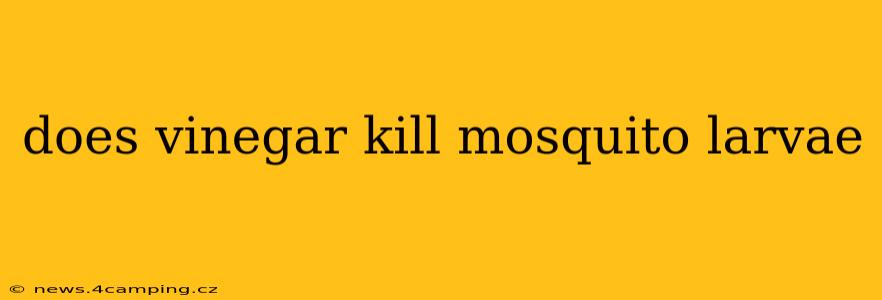Does Vinegar Kill Mosquito Larvae? A Deep Dive into Mosquito Control
Mosquitoes are a persistent nuisance, and their larvae are a significant part of the problem. Many homeowners search for effective and eco-friendly ways to control these pests, leading to the frequent question: Does vinegar kill mosquito larvae? The short answer is: it depends. While vinegar isn't a guaranteed mosquito larva killer, it can play a role in a multi-pronged approach to mosquito control. Let's explore this further.
How Effective is Vinegar Against Mosquito Larvae?
Vinegar's acidity can disrupt the delicate environment mosquito larvae need to survive. The acetic acid in vinegar can, to some extent, hinder their growth and development. However, it's not a potent larvicide like some commercially available products. The effectiveness of vinegar relies heavily on factors like:
- Concentration: A higher concentration of vinegar (e.g., white distilled vinegar) might show slightly better results than a diluted version.
- Application Method: Simply pouring vinegar into standing water may not be enough. Thorough saturation of the breeding grounds is crucial.
- Larval Stage: The effectiveness may vary depending on the age and stage of the larvae. Younger larvae might be more susceptible.
- Water Conditions: The pH of the water and other existing substances in the water can affect the vinegar's efficacy.
What About Other Natural Mosquito Control Methods?
While vinegar might offer some control, it's not a standalone solution. For effective mosquito larvae eradication, consider these complementary methods:
- Removing Standing Water: This is the most effective mosquito control measure. Eliminate any sources of standing water around your property, such as flower pots, birdbaths, clogged gutters, and even small puddles.
- Biological Control: Introduce natural predators like mosquito fish (Gambusia affinis) to your ponds or water features. These fish actively feed on mosquito larvae.
- Bacillus thuringiensis israelensis (Bti): This naturally occurring bacterium is highly effective against mosquito larvae and is available commercially as a larvicide. It’s a much more reliable option than vinegar.
- Essential Oils: Some essential oils, like lemon eucalyptus oil, possess mosquito-repelling properties, although their efficacy against larvae is limited.
Can Vinegar Repel Adult Mosquitoes?
While the focus is often on larvae, many wonder if vinegar can repel adult mosquitoes. The answer is likely no. There's no scientific evidence suggesting vinegar effectively repels adult mosquitoes. Other repellents, like DEET-based products or citronella candles, are far more effective.
What are the Best Ways to Get Rid of Mosquito Larvae?
The most comprehensive approach involves a combination of strategies. First, diligently remove standing water. Then, consider using Bti for larger bodies of water or employing mosquito fish for ponds. Vinegar can be a supplementary measure, but don't rely on it as the primary method.
Is Vinegar Harmful to Beneficial Insects or Pets?
Vinegar is generally considered safe for the environment and pets when used in appropriate concentrations. However, excessive use can disrupt the natural balance of your garden ecosystem. Avoid over-application. Always follow any product instructions if using vinegar in combination with other substances.
In conclusion, while vinegar might offer a minor contribution to mosquito larvae control, it shouldn't be considered a primary method. A multi-pronged approach that focuses on eliminating breeding grounds, using biological controls, and, if necessary, safe larvicides, is far more effective and sustainable.
